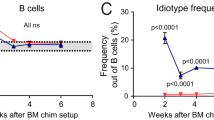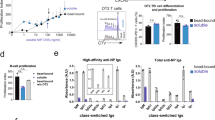Abstract
Phosphocholine (PC) is the immunodominant epitope found on the surface of a number of microorganisms, including Streptococcus pneumoniae (SPn), and is thought to play a vital role in the pathogenesis of SPn. B cells expressing M167Hκ24L immunoglobulin receptors specific for PC have been shown to be autoreactive in that they undergo clonal deletion in both X-linked immune-deficient and Rag−/− mice. We have now shown that B cells expressing M603Hκ8L PC-specific receptors also delete in Rag−/− mice, whereas those expressing T15Hκ22L transgenes do not delete. However, T15Hκ22L B cells are lost in normal heterozygous transgenic mice because they cannot compete with normal B cells. These data indicate that M167Hκ24L and M603Hκ8L PC-specific B cells are recognizing an autoantigen expressed on membranes which causes them to downregulate their receptors and clonally delete, while T15Hκ22L B cells are tolerized by a soluble form of PC-antigen which results in their being trapped in the spleen. Thus, the types of tolerance seen in autoreactive PC-specific B cells are dependent on the idiotype of the receptors expressed.
This is a preview of subscription content, access via your institution
Access options
Subscribe to this journal
Receive 12 digital issues and online access to articles
$119.00 per year
only $9.92 per issue
Buy this article
- Purchase on Springer Link
- Instant access to full article PDF
Prices may be subject to local taxes which are calculated during checkout




Similar content being viewed by others
References
Luning Prak ET, Monestier M, Eisenberg RA . B cell receptor editing in tolerance and autoimmunity. Ann N Y Acad Sci 2011; 1217: 96–121.
Basten A, Silveira PA . B-cell tolerance: mechanisms and implications. Curr Opin Immunol 2010; 22: 566–574.
Butler JE, Zhao Y, Sinkora M, Wertz N, Kacskovics I . Immunoglobulins, antibody repertoire and B cell development. Dev Comp Immunol 2009; 33: 321–333.
Cruickshank MN, Ulgiati D . The role of notch signaling in the development of a normal B-cell repertoire. Immunol Cell Biol 2010; 88: 117–124.
Dunn-Walters DK, Ademokun AA . B cell repertoire and ageing. Curr Opin Immunol 2010; 22: 514–520.
Yarkoni Y, Getahun A, Cambier JC . Molecular underpinning of B-cell anergy. Immunol Rev 2010; 237: 249–263.
Hu L, Rezanka LJ, Mi QS, Lustig A, Taub DD, Longo DL et al. T15-idiotype-negative B cells dominate the phosphocholine binding cells in the preimmune repertoire of T15i knockin mice. J Immunol 2002; 168: 1273–1280.
Kenny JJ, Derby EG, Yoder JA, Hill SA, Fischer RT, Tucker PW et al. Positive and negative selection of antigen-specific B cells in transgenic mice expressing variant forms of the V(H)1 (T15) heavy chain. Int Immunol 2000; 12: 873–885.
Kenny JJ, Fischer RT, Lustig A, Dintzis H, Katsumata M, Reed JC et al. bcl-2 alters the antigen-driven selection of B cells in mukappa but not in mu-only Xid transgenic mice. J Immunol 1996; 157: 1054–1061.
Mi QS, Rezanka LJ, Lustig A, Zhou L, Longo DL, Kenny JJ . The M603 idiotype is lost in the response to phosphocholine in terminal deoxynucleotidyl transferase-deficient mice. Eur J Immunol 2002; 32: 1139–1146.
Mi QS, Zhou L, Schulze DH, Fischer RT, Lustig A, Rezanka LJ et al. Highly reduced protection against Streptococcus pneumoniae after deletion of a single heavy chain gene in mouse. Proc Natl Acad Sci USA 2000; 97: 6031–6036.
Feeney AJ, Clarke SH, Mosier DE . Specific H chain junctional diversity may be required for non-T15 antibodies to bind phosphorylcholine. J Immunol 1988; 141: 1267–1272.
Williams KR, Claflin JL . Clonotypes of anti-phosphocholine antibodies induced with Proteus morganii (Potter). I. Structural and idiotypic similarities in a diverse repertoire. J Immunol 1980; 125: 2429–2436.
Kenny JJ, Lustig A, Longo DL . Positive selection of low affinity autoreactive B cells. Curr Top Microbiol Immunol 2000; 252: 39–45.
Kenny JJ, Finkelman F, Macchiarini F, Kopp WC, Storb U, Longo DL . Alteration of the B cell surface phenotype, immune response to phosphocholine and the B cell repertoire in M167 mu plus kappa transgenic mice. J Immunol 1989; 142: 4466–4474.
Kenny JJ, Rezanka LJ, Lustig A, Fischer RT, Yoder J, Marshall S et al. Autoreactive B cells escape clonal deletion by expressing multiple antigen receptors. J Immunol 2000; 164: 4111–4119.
Goodnow CC, Cyster JG, Hartley SB, Bell SE, Cooke MP, Healy JI et al. Self-tolerance checkpoints in B lymphocyte development. Adv Immunol 1995; 59: 279–368.
Taki S, Meiering M, Rajewsky K . Targeted insertion of a variable region gene into the immunoglobulin heavy chain locus. Science 1993; 262: 1268–1271.
Storb U, Pinkert C, Arp B, Engler P, Gollahon K, Manz J et al. Transgenic mice with mu and kappa genes encoding antiphosphorylcholine antibodies. J Exp Med 1986; 164: 627–641.
Kenny JJ, Moratz CM, Guelde G, O'Connell CD, George J, Dell C et al. Antigen binding and idiotype analysis of antibodies obtained after electroporation of heavy and light chain genes encoding phosphocholine-specific antibodies: a model for T15-idiotype dominance. J Exp Med 1992; 176: 1637–1643.
Guise JW, Lim PL, Yuan D, Tucker PW . Alternative expression of secreted and membrane forms of immunoglobulin mu-chain is regulated by transcriptional termination in stable plasmacytoma transfectants. J Immunol 1988; 140: 3988–3994.
Kenny JJ, O'Connell C, Sieckmann DG, Fischer RT, Longo DL . Selection of antigen-specific, idiotype-positive B cells in transgenic mice expressing a rearranged M167-mu heavy chain gene. J Exp Med 1991; 174: 1189–1201.
Taki S, Schwenk F, Rajewsky K . Rearrangement of upstream DH and VH genes to a rearranged immunoglobulin variable region gene inserted into the DQ52-JH region of the immunoglobulin heavy chain locus. Eur J Immunol 1995; 25: 1888–1896.
Acknowledgements
We are grateful to Dr Klaus Rajewsky for providing T15i KI mice and mu KO mice, to Dr Ursula Storb for M167H chain mice and M167Hκ24L mice, and to J. Latham Claflin for M603 H and Kappa 8 L transgenic mice. We thank Randy Fisher, Anna Lustig and Dr Louis Razanka for technical assistance. This work was supported by the Gerontology Research Institute, NIA, NIH.
Author information
Authors and Affiliations
Corresponding author
Ethics declarations
Competing interests
The authors have no financial conflicts of interest.
Rights and permissions
About this article
Cite this article
Mi, QS., Kenny, J. Types of tolerance seen in autoreactive phosphocholine-specific B cells are dependent on the idiotype of the receptors expressed. Cell Mol Immunol 10, 311–316 (2013). https://doi.org/10.1038/cmi.2013.17
Received:
Revised:
Accepted:
Published:
Issue Date:
DOI: https://doi.org/10.1038/cmi.2013.17



